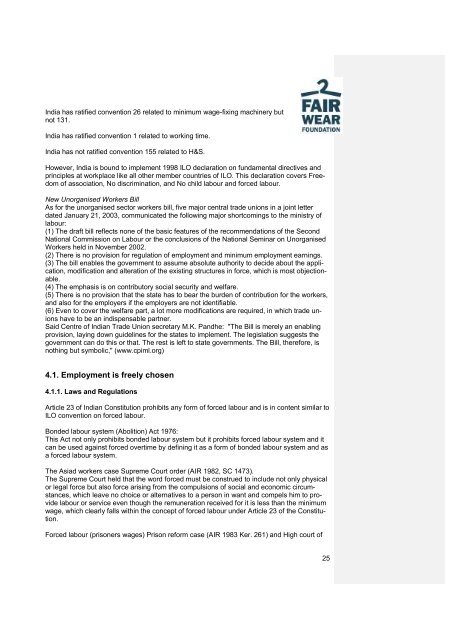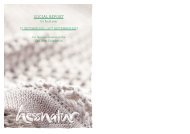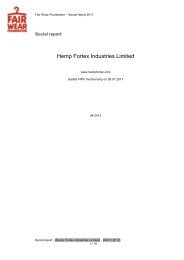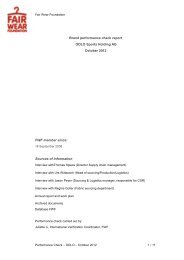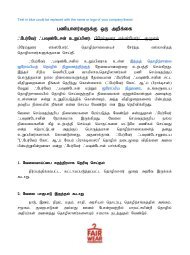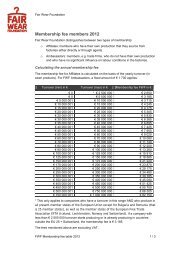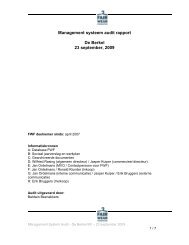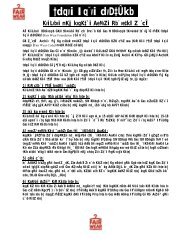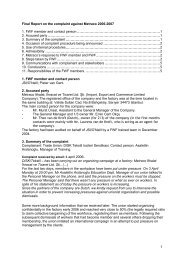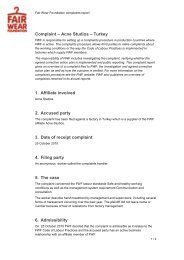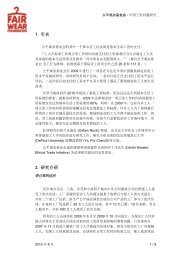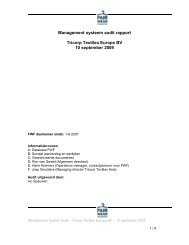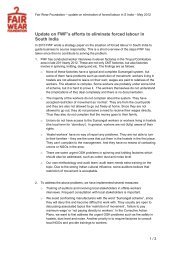Background Study Tirupur - Fair Wear Foundation
Background Study Tirupur - Fair Wear Foundation
Background Study Tirupur - Fair Wear Foundation
You also want an ePaper? Increase the reach of your titles
YUMPU automatically turns print PDFs into web optimized ePapers that Google loves.
India has ratified convention 26 related to minimum wage-fixing machinery but<br />
not 131.<br />
India has ratified convention 1 related to working time.<br />
India has not ratified convention 155 related to H&S.<br />
However, India is bound to implement 1998 ILO declaration on fundamental directives and<br />
principles at workplace like all other member countries of ILO. This declaration covers Freedom<br />
of association, No discrimination, and No child labour and forced labour.<br />
New Unorganised Workers Bill<br />
As for the unorganised sector workers bill, five major central trade unions in a joint letter<br />
dated January 21, 2003, communicated the following major shortcomings to the ministry of<br />
labour:<br />
(1) The draft bill reflects none of the basic features of the recommendations of the Second<br />
National Commission on Labour or the conclusions of the National Seminar on Unorganised<br />
Workers held in November 2002.<br />
(2) There is no provision for regulation of employment and minimum employment earnings.<br />
(3) The bill enables the government to assume absolute authority to decide about the application,<br />
modification and alteration of the existing structures in force, which is most objectionable.<br />
(4) The emphasis is on contributory social security and welfare.<br />
(5) There is no provision that the state has to bear the burden of contribution for the workers,<br />
and also for the employers if the employers are not identifiable.<br />
(6) Even to cover the welfare part, a lot more modifications are required, in which trade unions<br />
have to be an indispensable partner.<br />
Said Centre of Indian Trade Union secretary M.K. Pandhe: "The Bill is merely an enabling<br />
provision, laying down guidelines for the states to implement. The legislation suggests the<br />
government can do this or that. The rest is left to state governments. The Bill, therefore, is<br />
nothing but symbolic," (www.cpiml.org)<br />
4.1. Employment is freely chosen<br />
4.1.1. Laws and Regulations<br />
Article 23 of Indian Constitution prohibits any form of forced labour and is in content similar to<br />
ILO convention on forced labour.<br />
Bonded labour system (Abolition) Act 1976:<br />
This Act not only prohibits bonded labour system but it prohibits forced labour system and it<br />
can be used against forced overtime by defining it as a form of bonded labour system and as<br />
a forced labour system.<br />
The Asiad workers case Supreme Court order (AIR 1982, SC 1473).<br />
The Supreme Court held that the word forced must be construed to include not only physical<br />
or legal force but also force arising from the compulsions of social and economic circumstances,<br />
which leave no choice or alternatives to a person in want and compels him to provide<br />
labour or service even though the remuneration received for it is less than the minimum<br />
wage, which clearly falls within the concept of forced labour under Article 23 of the Constitution.<br />
Forced labour (prisoners wages) Prison reform case (AIR 1983 Ker. 261) and High court of<br />
25


